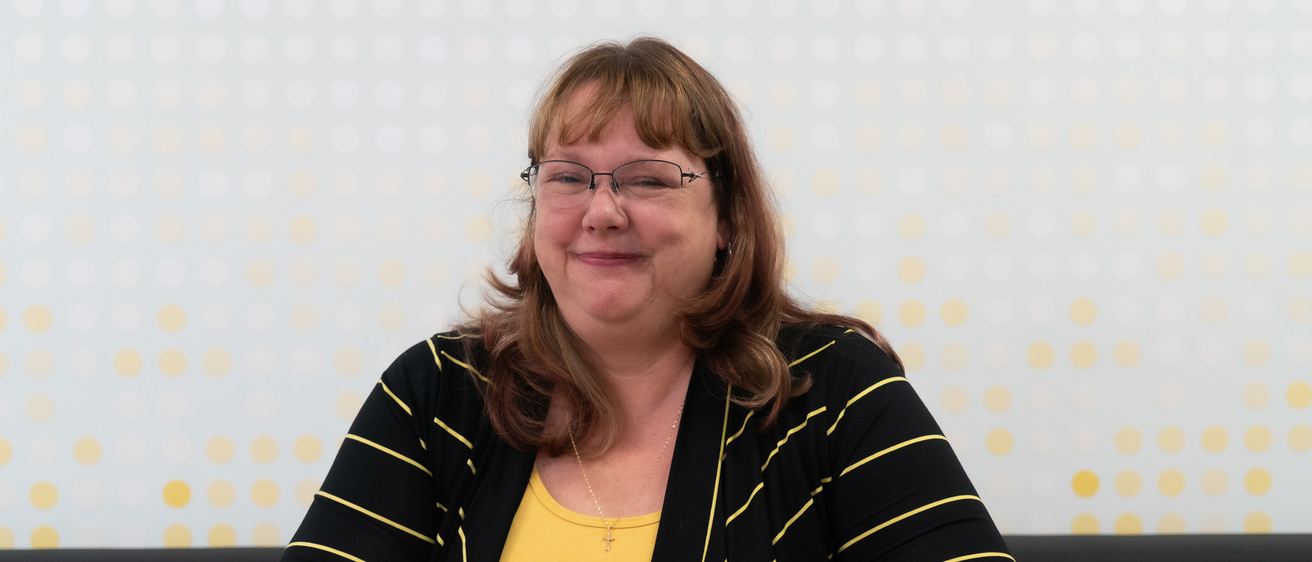Cheryl Ferguson says she was meant to be in the Learning Sciences and Educational Psychology doctoral program.
Ferguson, who lives in Cedar Rapids, spent 20 years in general and special education, and she had always wanted to go back to school for a doctoral degree. She was motivated to develop cognitive tools to help adults, leading her to apply to the University of Iowa College of Education.
Sadly, while in her program, Ferguson suffered the loss of both of her parents. Her mother died as a result of dementia the second semester after she was accepted and her father died in February 2023.
Ferguson says though she had to slow down her work due to her grief, the faculty and advisors at the College of Education’s program kept her going while being there for her.
“I was meant to be here because of the supportive community that was able to wrap around and help me through those huge life events,” she says.
Ferguson’s experience caring for her mother with dementia has inspired the research she is doing now as a doctoral candidate, which aims to increase independence for adults with dementia.
She drew connections between the experiences of her mom and the experiences of her students in a classroom specifically designed for learners with autism.
“I'm sitting there watching the two environments, and I'm thinking about the struggles that you have when you have autism. You have memory problems, you have language problems, you have executive functioning problems, you have self-regulation problems,” Ferguson says. “And as I watched mom progress through the disease and while teaching in that class, I started making connections to mom's memory problems and mom's language problems, and mom's self-regulation problems.”
She started thinking about how research done on with youth who are autistic could be applied to adults. Her desire to explore that idea inspired her to apply to the University of Iowa.
In her pilot study, Ferguson explored how access to services such as transportation or managing pill distribution is decreased once a person leaves the school system. The research looked at the shortage of providers and why people leave the field.
“How do we help people who are working with individuals with dementia, traumatic brain injury and autism, develop skills to be better providers and feel competent, so that they can stay in the profession?” Ferguson says.
Currently, Ferguson is working on developing interventions for adults, particularly those affected by degenerative brain diseases, to extend their independence and quality of life.
One of the structures Ferguson says she could assist with is distributed cognition, which is an approach that suggests cognition doesn’t just happen within the brain, but by using factors in the external environment to aid cognition. This could be applied to dementia patients who get confused when they are waiting for their lunch, for example, by showing them a picture of their food.
“When you can't remember why you're sitting there or what you ordered and the environment is louder, then you can see agitation,” she says. “And by presenting just a simple visual, ‘This is what you ordered,’ that acts as a memory holder. Oh, yeah, that's what we ordered. I'm sitting here having lunch. I just need to wait for the food.”
Ferguson expects to graduate from the College of Education in 2024.
“My life goal would be to really work closely with people in the dementia community and help developed those structures and interventions and supports, again, to extend independence and quality of life,” she says.
She says she’s been grateful for the support of College of Education advisors for keeping her on track and encouraging her to pursue important research as she dealt with the loss of her parents.
“Dissertations are huge things and death is a huge thing and it would be easy to completely derail,” Ferguson says. “But they were they were compassionate and supportive and still just really checking in to keep that in the front of my mind, because it probably would have been would have been very easy to drop out of the program.”
Learning Sciences Graduate Student Conference draws scholars from across country
Cheryl Ferguson presented her work using Virtual Reality headsets in classrooms at the Learning Sciences Graduate Student Conference, which will be held at the University of Iowa on Saturday and Sunday, Oct.14 and 15, in the Baker Teacher Leader Center.
The conference was organized by and for graduate students to create an environment where researchers can learn how to professionally present and defend their ideas in a safe space. The event is free to attend. Registration is open online, and participants can also register at the door.
This year, the conference was opened up to researchers outside of the learning sciences who were welcome to share their work. Undergraduate students were also welcome to attend keynotes and sessions on Saturday. Professors were also invited to watch keynote speakers, but were not allowed into the sessions where students are presenting their work.
An estimated 90 graduate students and 15 undergraduate students participated.
For more information, contact lsgsconference@gmail.com.
Graduate students can register online here.
Undergraduates can register online here.
Fast facts
- The opening keynote was delivered by Marcelo Worsley, an associate professor of computer science and learning sciences at Northwestern University.
- The theme of the 2023 conference was Thriving in the Wilds. The conference asked the question, "What does it mean to thrive, instead of just surviving?"
- This was the Eighth Annual Learning Sciences Graduate Student Conference.
- Twenty-two graduate students (MA & PhD) are currently in the Learning Sciences and Educational Psychology program in the UI College of Education.
